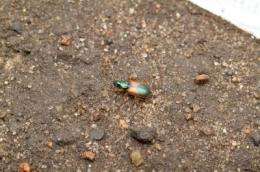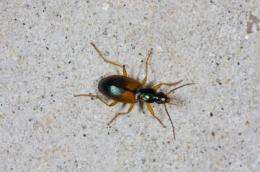Predators hunt for a balanced diet

An international team of scientists from the Universities of Exeter and Oxford in the UK, University of Sydney (Australia), Aarhus University (Denmark) and Massey University (New Zealand) based their research on the ground beetle, Anchomenus dorsalis, a well-known garden insect that feasts on slugs, aphids, moths, beetle larvae and ants.
The team collected female beetles from the wild and split them into two groups in the laboratory. Half of the beetles were offered a choice of foods, some that were high in protein and some that were high in fat. The other half were not given a choice of what to eat: some were only given food that was higher in protein and others just had higher-fat foods, none of which provided the right nutritional balance. The beetles that were provided with a range of foods selected the balance of protein and fat that was optimal for producing healthy eggs. These beetles produced more eggs than the beetles that did not have the right nutritional balance.

Previous research on insects has shown that herbivores such as butterfly larvae and grasshoppers and omnivores like fruit flies and crickets select food that will give them a balanced diet. However, until now scientists have assumed that predators can only focus on obtaining sufficient calories in their diets. This is the first research to show that predators also select food on the basis of its nutritional value. Although this study focuses on one insect species, the researchers believe that this is likely to be true for predators across the animal kingdom.
Lead researcher Dr Kim Jensen of the University of Exeter said: "At a time of year when many of us are focused on healthy eating, it is interesting to see that predators are also selective about what they eat. Biologists have previously assumed that predators cannot afford to be fussy and that they are simply focused on getting the right quantity of food, rather than quality. We show for the first time that they do actually select the foods that will give them the right balance of nutrients.
"Our findings could help further our understanding of food webs and how communities of animals interact in the wild."
Provided by University of Exeter

















